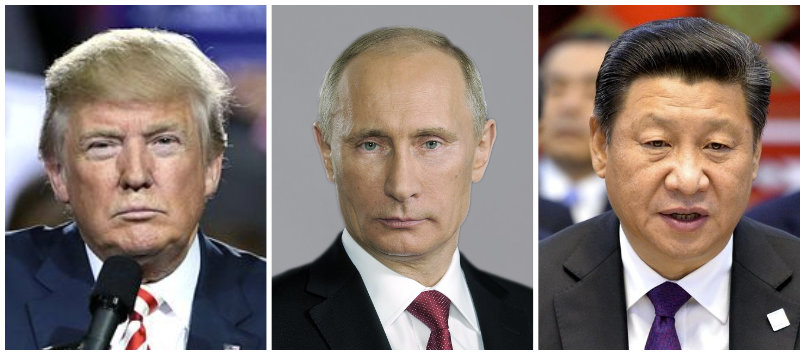Geopolitical tug-of-war in Eastern Europe
June 17, 2019 | Expert Insights

Background
Europe’s Eastern Bloc is a loosely defined geopolitical region which, according to the United Nations, includes Bulgaria, Czech Republic, Hungary, Poland, Romania, Russian Federation, and Slovakia, as well as the republics of Belarus, Moldova, and Ukraine. Several eastern European countries were former USSR member-states which exercised their sovereignty and looked westward after the collapse of the iron curtain. These countries were predominantly communist nations but today they are mostly Representative Democracies. Following the dissolution of the USSR, the Eastern Bloc countries have found themselves fighting to maintain their national identities. Even during WW2, these nations lost considerable territory to both axis and allied powers. This might explain why European Bloc nations find it difficult to find to choose when it comes to reconciling diverging interests between the East and the West. The geographic positioning of Eastern bloc nations places them in an ideological crossroads between the democratic values of Western Europe and its historical ties to communism in the East (Russia).
Analysis
Trump recently signed a new defense deal with the Polish president, Andrzej Duda. Under the terms of this deal, he will be sending 1,000 troops to Poland in light of Poland's decision to purchase new F-35's. This deal makes a strong statement to Russia that when it comes to Eastern Europe, the U.S is here to stay.
Trump is also working toward improving America’s relationship with Hungary. At a recent meeting with the Hungarian Prime Minister Victor Orban, Donald Trump lauded Orban’s immigration policies and stated that the two leaders were more similar than different.
Donald Trump was actually the first president to meet with the Hungarian Prime Minister in over 15 years since both Obama and George W. Bush refused to meet with him. There is a bi-partisan concern amongst American lawmakers that entertaining leaders who have tried to undermine democracy will send the wrong message that it is okay to do so. But perhaps, in this case, capitalizing on economic opportunities in Eastern Europe is a more important objective for Trump than the protection of democratic values.
US relations with Eastern Europe has improved due to the fact that the current administration is more center-right than preceding presidencies in the recent past. This has helped leaders from both sides discover some common ground over which agreements can be reached and deals made. Such an improvement in diplomatic relations comes at a crucial time for the US with both Russia and China trying to capitalize on eastern-European markets.
Russia has for a long time held a monopoly over the eastern European energy sector which enables it to wield its political influence in the region. China has a large presence in the telecom sector and has made several investments in critical infrastructure projects in Eastern Europe. Trump’s trade-war with China threatens Chinese economic interests in the region. Due to information security concerns, the US has taken action against Chinese tech giant Huawei, which has a very large presence in Eastern Europe.
Eastern Bloc countries in their national interest must weigh the trade-off between Chinese led economic progress versus a strengthened US-led defense force in the region. This comes at a time when Russia is furthering its geopolitical objectives in Ukraine and the Crimean Peninsula. Stronger ties between the US and Eastern Europe will give Trump an opportunity to strategically develop a counter-narrative to both Russia and China.
Counterpoint
Not all Eastern European nations are so deeply divided between the east and the west. Countries like North Macedonia and Albania have submitted applications to accede to the European Union (EU). They have been willing to undergo reform as directed by EU nations to be considered for membership. Several member-states are reluctant to enter talks with these countries, but an argument can be made that rejecting their membership might give their eastern rivals an advantage.
Assessment
It is our assessment that although Eastern European nations are under immense pressure to choose amidst increasing tensions between the US and China, they must put their national interests first. We think that an increase in defense spending by NATO in Eastern Europe is consequential to the fact that Russia is likely to be perceived as a threat to these countries. But major defense deals do not come without their caveats and expectations. The leaders of Eastern Bloc countries must carefully negotiate between national security and economic growth whilst maintaining control over their system of governance.
We feel that some of the countries in the region are currently undergoing political transformations of their own, which seem to be increasingly aligned with western ideals. For countries that are a little less democratic, it might be a good idea for them to take complete advantage of US support under the current administration.
We think that Trump’s focus on Eastern-Bloc nations is motivated by pure economic interest rather than ideological differences with the East (as was the case during the Cold war). Under Trump’s administration, US-Russia diplomatic relations have been quite friendly. We feel like it wouldn’t make much sense for Trump to ruin his progress with Putin by directly challenging Russia’s military power in Eastern Europe.








Comments